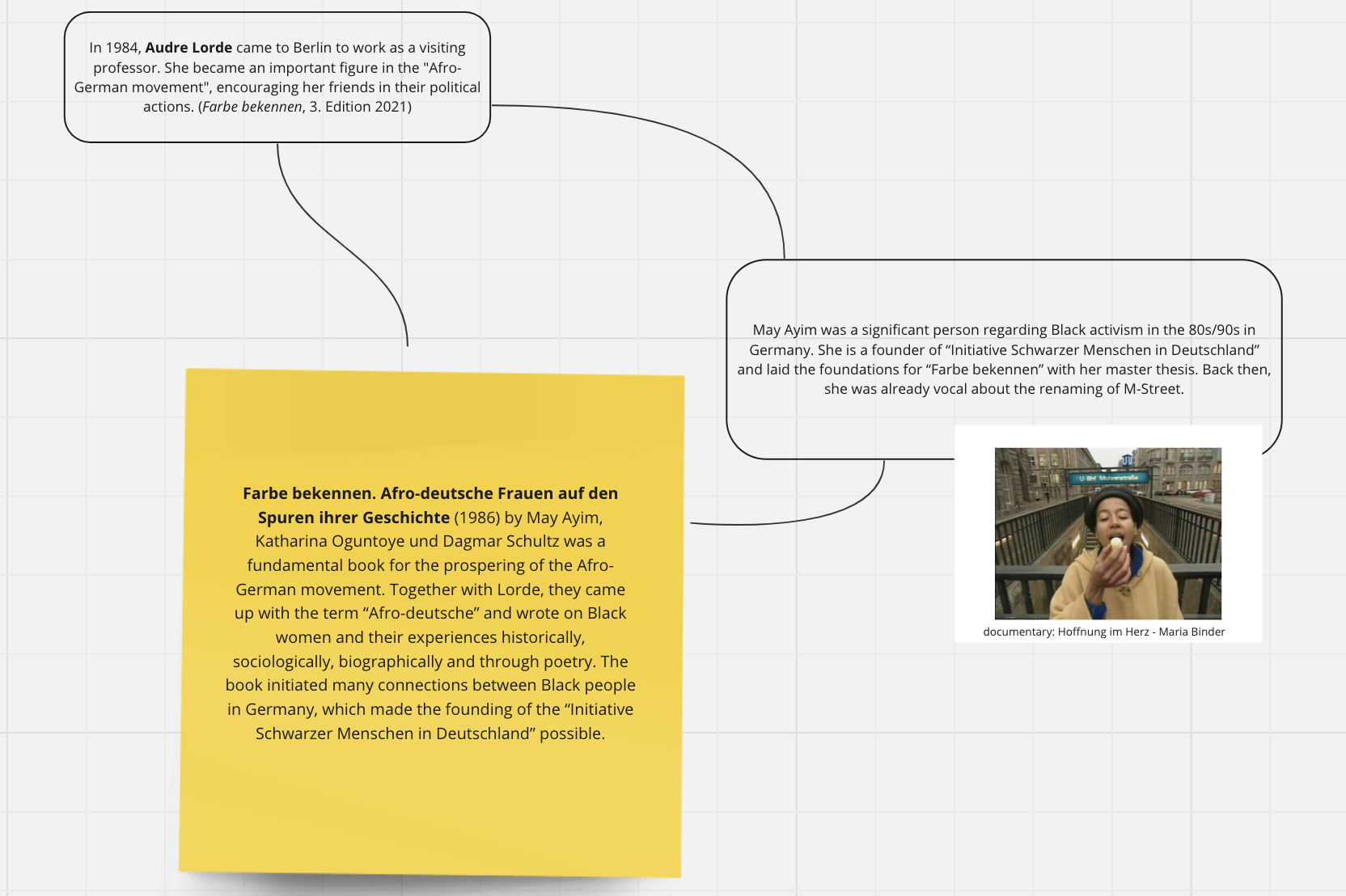RENAMING HISTORY
This page is dedicated to the renaming struggle of M-Straße in Berlin-Mitte, as it is the context out of which Amo Collective Berlin emerged from. We acknowledge that this information is not a complete representation of the renaming struggle of M-Straße, so if you have information, stories, images that you would like to pass on to us for this website or the archive we are establishing, you are invited to send us an email to amocollectivede@gmail.com or in Contact form
By providing this information we attempt at preserving history of urban and anti-racist activism, share knowledge and make it accessible to a greater public.
Timeline
- In the 1990s May Ayim was outspoken in her opposition of the street name. The documentary “May Ayim: Hoffnung im Herz” (1997) by Maria Binder, shows a short clip of May Ayim standing in front of the subway station “Møhrenstraße” slowly eating a white “Schaumkuss” – making reference to the dark equivalent of the sweet which has been called “Møhrenkopf” in racist German language use.
It is possible to think of her symbolically as “eating white supremacy”. A strong subversive image.
- In 2004/5 all twenty organizations forming the Afrika-Rat Berlin Brandenburg demanded a renaming of the street to honor an African person, it says on decolonize-mitte.de.
- In 2006 students of the Institute for European Ethnology became more engaged with postcolonial theory and organized classes (Projekttutorien) that dealt with the history of the area and the street name in which the institute is located. One class turned into the project “Unterm Teppich? Rassistische Konzepte, koloniale Fantasien am Beispiel eines Berliner Straßennamens” which created a digital mind map which was shown at the Black European Studies conference in 2006 and later translated into the website: m-straße.de (inactive).
- In 2007 the student initiative of the Institute for European Ethnology organized a panel discussion between activists and the institute’s director at that time. In these years moments of tension between students and the Institute’s director/teachers arose when it came to the renaming.
- “Aktionsgruppe M-Straße” started an annually Antikoloniales Straßenfest in 2013, which was later continued by DecolonizeBerlin, who expanded it into Antikoloniales Amostraßenfest to highlight the proposed renaming of M-street into Anton-Wilhelm-Amo Straße.
- In 2015 there was a political action, “Occupy M-Straße”, that invited people to “Protest-Kaffetrinken” (drink coffe as protest together) against the racist street and subway station name. https://youtu.be/078nhRlkaYE?si=FmtHrZRViN6ZxzpV (Occupy Mohrenstraße 2015)
- In the following years postcolonial and anti-racist perspectives became more part of the Institute’s agenda. Around 2017 a letter to the editor was another catalysator for the Institute’s involvement because a member of the “Deutsches Institut für Wirtschaftsforschung” (DIW) which is also located in M-street, thematised the street name issue in an article which sparked turmoil among the readers.
- In June 2020 the Institute for European Ethnology came forward with an open letter called “Kein Rassismus vor unserer Haustür!” (“No racism on our doorstep!”) with a long list of signatures which demanded the renaming of the street and the alliance of the neighborhood.
https://www.euroethno.hu-berlin.de/de/institut/ueber/kein-rassismus-vor-unserer-haustur-umbenennung-der-mohrenstrasse.pdf
This is when the Nachbarschaftsinitiative Anton-Wilhelm-Amo (NAWAS) was founded. A political initiative of the neighborhood.
Out of NAWAS the Amo Collective Berlin emerged, which creates artistic and scientific projects like the Amo Salon and the yearly Decolonial Flânerie.
- In 2020 the Bezirksverordnetenversammlung Mitte (BVV) decided that the renaming will take place. This is an important step when it comes to official approval but it is only the beginning of an enduring process, since the name is still M-Straße as of today (September, 2023)
- In June 2020, the Berliner Verkehrsbetriebe (BVG) announced they will rename the subway station from M-street to Glinkastraße. Their proposed renaming after Michail Iwanowitsch Glinka did not resonate well, because of antisemitic connections.
- The Nachbarschaftsinitiative Anton-Wilhelm-Amo (NAWAS) was founded as a network of all who have signed the Institute's Open Letter in 2020. A political initiative of the neighborhood.
- On August 21, 2020, only one day after the decision for renaming was announced, NAWAS initiated the first Decolonial Flanerie around the designated AW Amo Straße. Among the active performers who participated in the first Decolonial Flanerie were Silvy Chakkalakal (IfEE), Arjun Appadurai (New York University/IfEE), Bonaventure Soh Bejeng Ndikung (HKW), Arlette-Louise Ndakoze (SAVVY Contemporary) and Mnyaka Sururu Mboro (Berlin Postkolonial e.V.).
- Out of NAWAS the Amo Collective Berlin emerged, which creates artistic and scientific projects like the Amo Salon and the yearly Decolonial Flânerie.
- In July 2023, Götz Aly, a historian who went legally against the renaming, had a court hearing in which his demand was turned down. Although the court hearing seemed like a success regarding the renaming, the final change was delayed for more than five years.
- On 23 August 2025 the decision of the Bezirksverordnetenversammlung Mitte to rename M*Straße after Anton Wilhelm Amo is finally taking place officially, on the occasion of the yearly Amo Fest organised by many Afro-diasporic and critical civil society groups, along them also the Amo Collective Berlin. On the same date, the subway station will also be renamed after Anton Wilhelm Amo.
Historical Layers
On the website of the Institute for European Ethnology there is a “FAQ zur Umbenennung der Møhrenstraße”. In this FAQ a lot of historical information connected to the street name, Anton Wilhelm Amo and Germany’s colonial entanglements is available (in German language). This part will be expanded in the near future.
- The street name “Møhrenstraße” was probably assigned its name in the year 1706 or 1707.
- The subway station name was changed to “Møhrenstraße” in 1991.
Find the FAQ here.

Resources
Partial list of organizations advocating for the street’s renaming:
- DecolonizeBerlin
- Anton-Wilhelm-Amo Erbschaft
- Postkolonial Berlin
- Decolonize Mitte
- Initiative Schwarze Menschen in Deutschland
- Afrika-Rat
- AfricaAvenir International
- Berliner Entwicklungspolitischer Ratschlag
- Migrationsrat Berlin-Brandenburg
- Nachbarschaftsinitiative Anton-Wilhelm-Amo Straße
and others